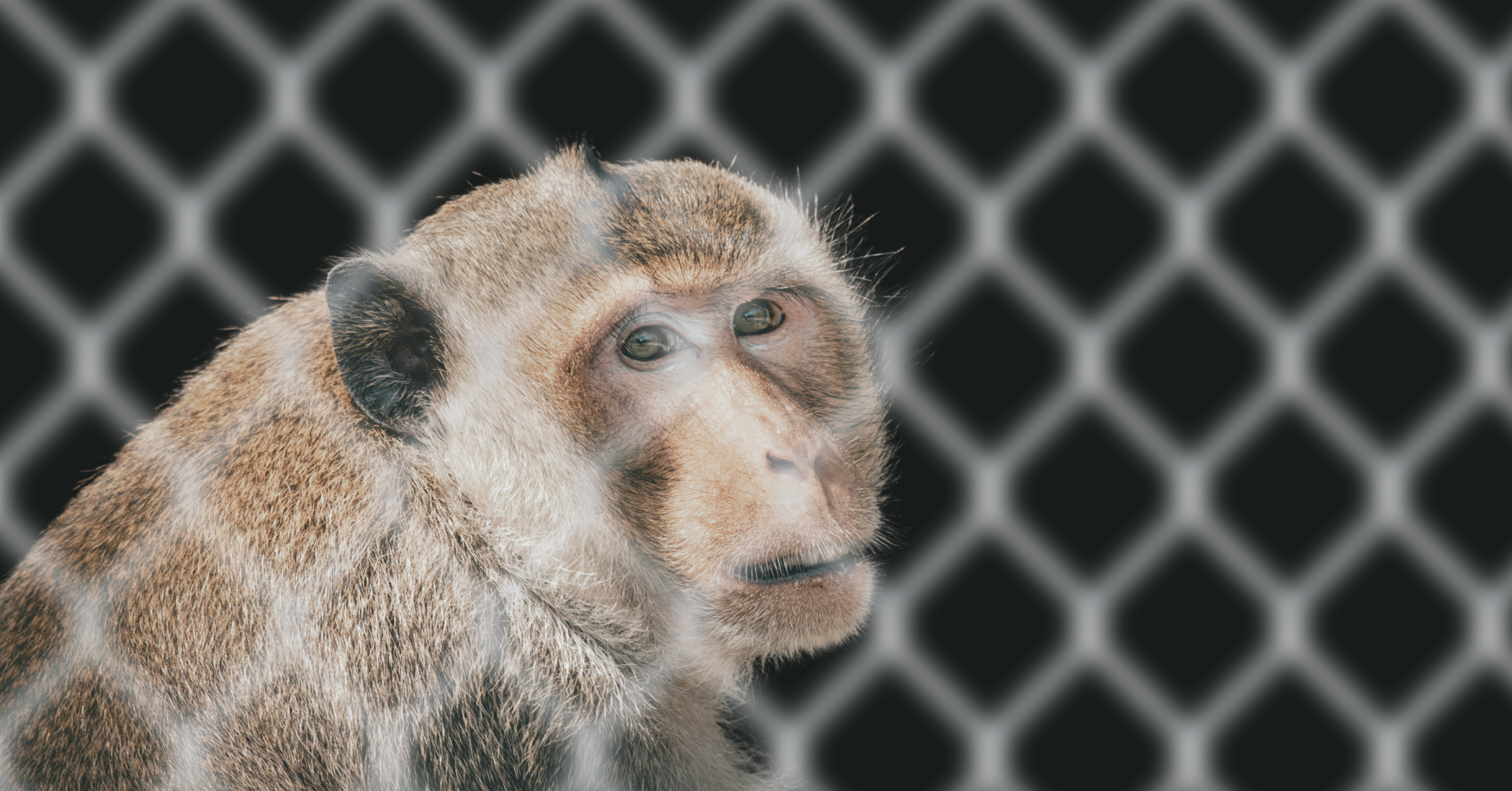
Feds Handed Over 1,296 Long-Imprisoned Monkeys to Industry
Why This Matters: This is more than a story about 1,296 monkeys—it’s a case study in how deeply the animal research industry is embedded within our own government.
If federal agencies can seize trafficked wildlife only to hand them back to the very corporation under investigation, then the systems meant to protect animals have been captured by industry. Future trafficking and exploitation of animals will continue unchecked unless we intervene.
After more than two-and-a-half years in quasi-federal custody, 1,296 long-tailed macaques—who had been seized on suspicion of being illegally trafficked to the United States from the wilds of Asia, and whose bodies were recently valued by their captors at $27 million—have been quietly released to Charles River Laboratories.
These monkeys were originally “seized” by the U.S. Fish and Wildlife Service (FWS) after arriving at Dulles Airport, suspected of being wild-caught (rather than captive-bred), in violation of U.S. law—including protections under CITES, the global treaty aimed at preventing wildlife trafficking.
FWS never physically took possession of the monkeys, however. Instead, they “essentially seized them in place” at two of Charles River’s facilities—meaning the monkeys have spent years behind the very walls that the government has now decided will serve not only as their prisons, but also their torture chambers and graves.
After years’ of purported investigation, it seems that the U.S. Department of Justice has closed its grand jury and civil inquiries related to the monkeys’ origins, and FWS and the Department of the Interior have cleared the path for Charles River to retain—and further exploit—the monkeys.
This outcome—described as “a stunning act of capitulation” by the government to industry—sure looks a lot like government-sanctioned animal trafficking…
Indeed, even before the formal handoff was publicly acknowledged, insiders warned that federal agencies were considering a laundering-type scheme of their own: allowing Charles River to keep and use (i.e., repurpose) the seized long-tailed macaques as breeding stock. Their offspring would then be labeled “U.S. captive-bred,” effectively bypassing import restrictions and seeding a fresh pipeline of (likely trafficked) primates into U.S. labs.
In other words, the government was reportedly prepared to authorize the commercial breeding of illegally imported wildlife—to the direct financial gain of the very corporation it was supposedly investigating.
As disturbing as this is, it is entirely in keeping with the animal research industry’s documented capture of federal regulatory bodies.
Even the U.S. government’s specific relationship with Charles River has long been openly too close for comfort—and this latest chapter simply trips away any remaining pretense.
We previously reported on Charles River’s lucrative arrangement with the NIH, the world’s largest funder of animal research, by which it made tens of millions of dollars keeping supposedly “retired” NIH chimpanzees from sanctuary. That arrangement continued for years even though it would have cost the NIH less money to send the chimps to sanctuary and even after Charles River was charged with animal cruelty for the deaths of two of them and the neglect of a third.
Now, it appears we have witnessed another of Charles Rivers’ government-entrenched tentacles in action.

In a letter sent to federal officials shortly before the monkeys’ release to Charles River, PETA highlighted a “current apparent business relationship between Charles River and former Secretary of the Interior, David Bernhardt—who oversaw FWS during much of the 2017-2022 federal investigation into suspected monkey laundering in Cambodia….”
According to the letter, Bernhardt joined Charles River’s Vice President of Global Strategic Programs on site visits to three Cambodian monkey breeding facilities—including the very facility at the heart of the trafficking investigation—as part of a Charles River delegation.
The letter reads:
“Given the current allegations about the imminent release of the monkeys to Charles River, Bernhardt’s appearance at the facility with a U.S. fugitive still under indictment raises questions about whether he may have used prior agency connections to reestablish access to a blocked supply chain. A former cabinet official doing business with a Charles River executive and a monkey exporter wanted for federal crimes in the U.S. undermines the ability of authorities to enforce trafficking laws and impacts the prosecutions of wildlife smuggling cases.”
This is all exactly as the animal research wants it, of course—though it doesn’t want us to see it for what it is.
Americans for Medical Progress, one of the industry’s most vocal PR machines, praised the monkeys’ release to Charles River as a decision that “helps restore some much-needed stability” to industry.
This tells us that “stability” is now an industry euphemism for collusion, which, in this case, looks like:
- The federal government’s signing of 1,296 monkeys’ torture and death warrants, in benefit of the very corporation accused of illegally obtaining them; and
- The quiet closure of federal investigations into a major industry player, after one of its top executives traveled overseas with a former cabinet official who once oversaw both FWS and the Department of the Interior—the same agencies now responsible for handing over the monkeys.
Bottomline: The government of the world’s largest importer of monkeys for experimentation appears to be openly aligned with the world’s largest supplier of animals to laboratories.
Tragically, the fates of these 1,296 sentient beings may now be beyond our reach, but our obligation to act in their honor—and to protect the countless other victims who will follow unless and until this corrupt and violent industry is dismantled—has never been more urgent.
Your Call to Action: Urge the U.S. Fish and Wildlife Service to stop allying with the animal research industry and start protecting long-tailed and pig-tailed macaques by adding them to the Endangered Species list.
Share this article on X or Bluesky.
Or copy, paste, and share this link anywhere else:
riseforanimals.org/news/1296-monkeys